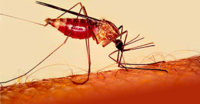-
Genetically engineered bacteria prevent mosquitoes from transmitting malaria

Malaria kills more than 800,000 people worldwide each year, many are children; researchers have genetically modified a bacterium commonly found in the mosquito’s midgut and found that the parasite that causes malaria in people does not survive in mosquitoes carrying the modified bacterium
-
-
Rattlesnakes in San Diego: potent, powerful venom a cause for concern

For the second year in a row, University of California-San Diego Medical Center toxicologists are reporting unusually powerful snake bites and unusually extreme patient reactions to those bites; since January, several patients have suffered bites with severe symptoms, such as difficulty breathing, often after a bite from the Southern Pacific Rattlesnake
-
-
Scientists show why swine flu virus develops drug resistance
H1N1-2009 is a new, highly adaptive virus derived from different gene segments of swine, avian, and human influenza; within a few months of its appearance in early 2009, the H1N1-2009 strain caused the first flu pandemic of the twenty-first century
-
-
Less costly anti-malarial drug
Malaria sickens 300-500 million people, and kills more than one million, annually; scientists are reporting development of a new, higher-yield, two-step, less costly process that may ease supply problems and zigzagging prices for the raw material essential for making the mainstay drug for malaria
-
-
Pandemic 2009 H1N1 vaccination may lead to pan-influenza vaccine
The pandemic 2009 H1N1 vaccine can generate antibodies in vaccinated individuals not only against the H1N1 virus, but also against other influenza virus strains including H5N1 and H3N2; the discovery brings closer the day of a pan-influenza vaccine
-
-
Researchers produce potential malarial vaccine from algae
Malaria affects more than 225 million people worldwide in tropical and subtropical regions, resulting in fever, headaches, and in severe cases coma and death; researchers have succeeded in engineering algae to produce potential candidates for a vaccine that would prevent transmission of the parasite that causes malaria
-
-
Malaria detection model wins Georgia Tech Spring Design Expo
Georgia Tech students design of a microfluidic cell sorter that aids in the detection of malaria; no current products exist that can be used for population screening at the desired sensitivity of buyers such as non-governmental organizations, while being both portable and non-electric
-
-
MRSA superbug spreads from big city hospitals to regional health centers
MRSA — methicillin-resistant Staphylococcus aureus — first started to appear around fifty years ago following the introduction of antibiotics, to which the bacteria has become increasingly resistant; scientists now find how the superbug spreads among different hospitals
-
-
Anti-malaria garment drives bugs away

Malaria kills 655,000 people annually in Africa; insecticide-treated nets are commonly used to drive away mosquitoes from African homes, but now there is another solution: a fashionable hooded bodysuit embedded at the molecular level with insecticides for warding off mosquitoes infected with malaria
-
-
Advanced genetic screening to speed vaccine development
Infectious diseases, both old and new, continue to exact a devastating toll, causing some thirteen million fatalities per year around the world; vaccines remain the best line of defense against deadly pathogens and now researchers are using clever functional screening methods to attempt to speed new vaccines into production that are both safer and more potent
-
-
H1N1 discovery paves way for universal flu vaccine
Each year, seasonal influenza causes serious illnesses in three to five million people and 200,000 to 500,000 deaths; university of British Columbia researchers have found a potential way to develop universal flu vaccines and eliminate the need for seasonal flu vaccinations
-
-
Bacteria found in caves could offer key to new antibiotics
Resistance to antibiotics among bacteria is a growing concern for human health; antibiotic-resistant bacteria found in one of the deepest, most isolated caves in the world could help scientists in the battle against superbugs
-
-
Inovio Pharmaceuticals gets DoD continuation grant for synthetic DNA vaccine delivery device
The U.S. Department of Defense has given a Small Business Innovation Research grant to Inovio Pharmaceuticals to continue developing a low-cost, non-invasive surface electroporation (EP) delivery device; the testing of the device in conjunction with Inovio’s synthetic DNA vaccines against viruses with bioterrorism potential, including hanta, puumala, arenavirus and pandemic influenza
-
-
Universal vaccines would allow wide-scale flu prevention

An emerging class of long-lasting flu vaccines could do more than just save people the trouble of an annual flu shot; a flu pandemic is difficult to predict and typically impossible to control through vaccination alone; universal vaccines, however, act on virus targets that are relatively constant across all types of flu, even pandemic flu
-
-
Antibiotic alternative to overcome drug-resisting infections
About 700 million people have symptomatic group A Streptococcus (GAS) infections around the world each year, and the infection can be fatal; researchers have found a potential alternative to conventional antibiotics that could fight infection with a reduced risk of antibiotic resistance
-
More headlines
The long view
A Shining Star in a Contentious Legacy: Could Marty Makary Be the Saving Grace of a Divisive Presidency?
While much of the Trump administration has sparked controversy, the FDA’s consumer-first reforms may be remembered as its brightest legacy. From AI-driven drug reviews to bans on artificial dyes, the FDA’s agenda resonates with the public in ways few Trump-era policies have.
